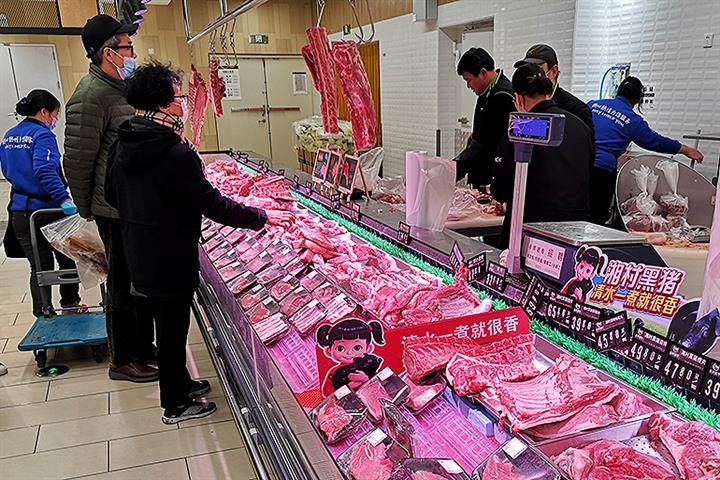 China’s Consumer Inflation Turns Positive in December as Pork Prices Rebound
China’s Consumer Inflation Turns Positive in December as Pork Prices Rebound(Yicai Global) Jan. 11 -- China’s Consumer Price Index inched up 0.2 percent last month from a year earlier, returning to positive territory after a rare month of deflation in November, data from the National Bureau of Statistics showed today.
The NBS attributed the return to inflation to higher prices of pork, fresh vegetables and fruit during the peak consumption season between the New Year’s holiday and the coming Lunar New Year break, as well as the impact of cold weather.
The CPI rose 0.7 percent from November. For the whole of 2020, it rose 2.5 percent.
Consumer demand continued to pick up last month, while the CPI rose due to cold weather and rising costs, said Dong Lijuan, a senior statistician of the NBS.
On a month-on-month basis, the CPI rose 0.7 percent in December from a 0.6 percent decline in November. Food prices that fell by 2.4 percent in November jumped 2.8 percent in December, lending support to a CPI gain of about 0.62 percentage point. Among food products, pork prices rose 6.5 percent from a 6.5 percent drop in November due to higher feed costs and higher seasonal demand.
The CPI went from a 0.5 percent year-on-year decline in November to a 0.2 percent increase in December. Food prices changed from a 2 percent decline in November to a 1.2 percent increase, which lent support to a CPI gain of about 0.26 point.
The strong rise in food and oil prices is the main driving force behind the rebound in CPI, according to Hua Chuang Securities.
Amid fluctuations in international crude oil prices, the cost of gasoline, diesel and liquefied petroleum gas rose 5.2 percent, 5.8 percent and 3 percent month on month, respectively, affecting the CPI by about 0.1 point, according to the NBS.
Pork prices stopped falling and rebounded because of strong demand in the peak season while supplies also recovered slowly, said Li Chao, chief economist with Zheshang Securities.
Pork Supply
Looking ahead, analysts believe that in the medium to long term a supply rebound will push pork prices downward. Overall inflationary pressures will be modest this year and core inflation will return to an upward trend as the economy recovers.
The core CPI, which factors out food and energy prices, rose 0.4 percent in December from a year earlier, down 0.1 point from November, the data showed.
The core CPI continued to hit a new low since records began in January 2013, mainly due to the reemergence of the Covid-19 pandemic, said Zheng Houcheng, director of Yingda Securities Research Institute. The core CPI is expected to have higher yearly growth in the latter months of this year, with the successful research, development and large-scale release of Covid-19 vaccines, and given the lower yearly core CPI growth in the last months of 2020.
China’s commodity prices will make moderate gains this year, with a rise of about 1.1 percent in the CPI throughout the year, according to a report by the Chinese Academy of Sciences’ Forecast Scientific Research Center.
The steady recovery of domestic demand last month, coupled with the continued rise in the cost of some international bulk commodities, has fueled gains in the prices of industrial products. China’s PPI rose 1.1 percent month on month in December, an increase of 0.6 point from the previous month, or a year-on-year decrease of 0.4 percent, a decline narrowed by 1.1 points from the previous month, the NBS data showed.
Regarding this year’s PPI, Zheng said it will show steady year-on-year growth in the first half in the context of gains in international oil and non-ferrous metal prices, including copper, coupled with a low base effect.
Editor: Peter Thomas